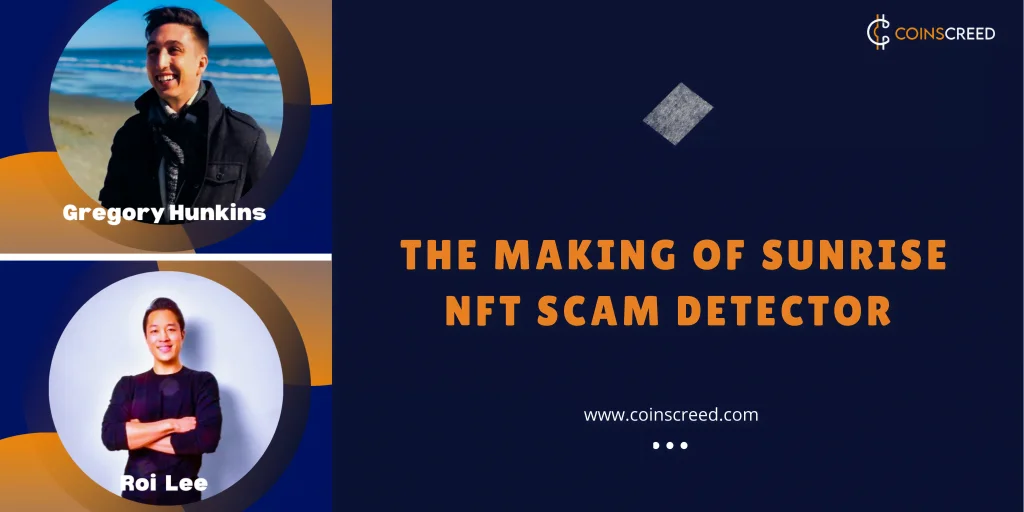
The last time someone scammed you, you probably cried into a pillow, counted your losses, and wished them away. Not for Gregory Hunkins and Roi Lee. They created Sunrise NFT Scam Detector — the software poised to be a threat to Non-Fungible Token scams.
The idea came from Gregory, the Co-founder and CTO of Sunrise. He got scammed in his first week of exploring investing in NFTs. In a way peculiar to common NFT scams.
Desperate ApeWives and a Fake Site
It is the pre-mint of the NFT project, Desperate ApeWives (DAW). Gregory joins the DAW Discord pre-mint. The public mint opens. He does not buy. Then, he regrets when Desperate ApeWives climbs in value, the most rated project on OpenSea.
Celebrities are joining. Gregory bids but gets outbid by people who want it more than he does. He takes his loss but remains hopeful.
One evening, he receives a message on Discord:
Desperate ApeWives Announcement: 📣
BONUS SALE IS NOW LIVE!
He clicks on the link. Everything on the website appears to be official. As before, the number of available mint spaces is rapidly dwindling. Not wanting to miss out again, he connects with his Wallet.
This link led Gregory to a fake mint site where he lost a thousand dollars. He told Roi the story, and they built Sunrise to protect other people from losing money or worse to NFT scams.
What is Sunrise NFT Scam Detector?
Gregory and Roi named their scam detector “Sunrise” because they want a ‘brighter’ Web3 and NFT space. The software is a browser extension that prevents NFT scams by verifying website URLs with OpenSea and databases.

When you visit a Web3 site, an icon appears in the top right corner. This informs you of the site’s reputation. Sunrise combines data from three primary sources to verify any website integrity. This includes the NFT marketplace, OpenSea API, CryptoScamDB (MetaMask), and Sunrise database.
This creates a configuration file that match Web3 URLs to trust scores — the measure of a site’s worthiness using online traffic analysis.
Early days of Sunrise NFT Scam Detector
Roi tells us it was difficult to gain people’s trust. For starters, folks in the Web3 and NFT sphere are often concerned about fraud. Some people felt that simply clicking the link would lead to a scam.
“This is technically impossible for Sunrise NFT Scam Detector,” Roi informs me.
The team worked to build an early online reputation. Still, some customers worry about their privacy. For the most part, it is because Sunrise is a browser extension.
But the NFT scam detector collects zero data from users and Google’s Chrome store approves its privacy policy. Roi, who met his co-founder via a mutual friend in 2019, says the extension is Open Source. This means anyone can look at how the product works, analyse and contribute to its development.
The team maintains that the Web3 and NFT market is just getting started. Their larger goal is to revamp Web3; make it a more secure and welcoming environment.
Role of Web3 in the Blockchain Ecosystem
The co-founders of Sunrise believe that people are getting better at scams. They do this on the internet, the banking system, and even in the judicial system. In the blockchain ecosystem, scams appear as Rug Pulls, Phishing Scams, Pump and Dump and so on.
This is where Web3 plays a role. It is transparent to track historical transactions. Every transaction is visible to the public. The Web3 area could be considerably more powerful if we can carefully grasp it and design better products while having adequate restrictions.
When they are not waging the war on the NFT scammers, the team at Sunrise is building Ssuper. This is a Web3 messenger that allows wallet-to-wallet communication and verifies who you’re speaking with.
It is available on iOS, Android, and the Web.
